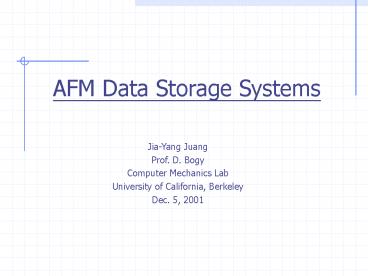AFM Data Storage Systems
1 / 22
Title: AFM Data Storage Systems
1
AFM Data Storage Systems
- Jia-Yang Juang
- Prof. D. Bogy
- Computer Mechanics Lab
- University of California, Berkeley
- Dec. 5, 2001
2
Outline
- Introduction
- AFM Cantilevers
- Cantilevers for Writing
- Cantilevers for Readback
- Multiple tip Arrays
- Further Considerations
3
Introduction
- Limit of magnetic recording (60-100 Gb/in2)
expected superparamagnetic limit - Ultrahigh areal density 400-500 Gb/in2
- Terabit capacity
- Small form factor miniaturized low-power
- High data rate 10 Mb/s for readback
100 kb/s for writing
4
Introduction (cont.)
Comparison between AFM and conventional ones
5
Introduction (cont.)
Research Groups on AFM Data Storage Systems
- IBM Zurich Research Laboratory, Switzerland.
(Vettiger, Despont, Durig, Binnig, etc.) -
Millipede 32X32 AFM array - Collaboration between Stanford Chui, Kenny,
Goodson, Quate, etc. IBM (Almaden Research
Center) Mamin, etc.
6
AFM Cantilevers
- Thermomechanical data storage systems
- Components media (polymer), tip with sensors,
moving scheme - Digital information is represented as data pits
on a polymer - The sharp tip contacts with the polymer by a
weak force 0.1 uN
7
Cantilevers for Writing
- Force heating at tip
- Writing speed is limited by thermal time
constant0.34um X 51um X 40um0.6us1um X 100um X
16um1us
Heavy doping
Light doping
8
Cantilevers for Readback
- Piezoresistive sensing (Chui, Kenny, Mamin,
etc.) - Thermomechanical sensing (IBM Zurich
Research Lab)
9
Piezoresistive Sensing
- Piezoresistivity deflection ?? change in
resistance - Cantilever deflection is measured as the tip
rides over pits - Data rates depend on the resonant frequency
0.34um X 10um ? f2.6MHz ?10Mbit/s (expected)
10
Thermomechanical Sensing
Changes in temperature are monitored while the
cantilever is scanned over data bits, providing a
means of detecting the bits
11
Writing Reading Animation
12
Erasing Rewriting
- Erasing data by heating the polymer to 150C
for a few seconds - Erase larger storage areas (no bit-level erase)
- Erasing, rewriting, and bit stability are
topics of ongoing research.
13
Moving Schemes
- Stylus-based scheme (phonograph) (Chui,
Kenny, Mamin, Vettiger, etc.)
14
Moving Schemes (cont.)
- Scanning approaching scheme (Millipede,
IBM Zurich Research Lab)
15
Multiple Tip Arrays
16
One Cantilever Cell
- Tip radius 20nm
- legs 50um X 10um X 0.5um
- platform 10um X 5um X 0.5um
- stiffness 1 N/m
- resonant frequency 200KHz
- thermal time constant 1us
17
SEM of the cantilever array section
Photograph of fabricated chip (14 mm X 7 mm)
18
Tips Characteristics
- Tip radius 20nm
- Tip height 1.7um
- Tip height homogeneity in an array 50nm(0.5)
19
SEM of Millipede Writing Results
Storage fields
Magnified views. Bit indentations/separations(100
-200Gb/in2)
Thermomechanical read-back
20
Further Considerations
- Overall system reliability, including bit
stability, tip and medium wear,
erasing/rewriting. - Limits of data rate (S/N ratio), areal density,
array and cantilever size. - CMOS integration.
- Optimization of write/read multiplexing scheme.
- Array-chip tracking
21
Fabrication
- Pattern oxide for tip
- Etch tip
- Pattern piezoresistor
- Pattern silicon nitride
- Pattern aluminum
- Pattern cantilever
Silicon micromachining steps for cantilevers with
tips and resistors
22
Fabrication (cont.)
- Deep trench etch through wafer
- Cantilever release
Backside silicon micromachining steps for
suspending cantilevers































